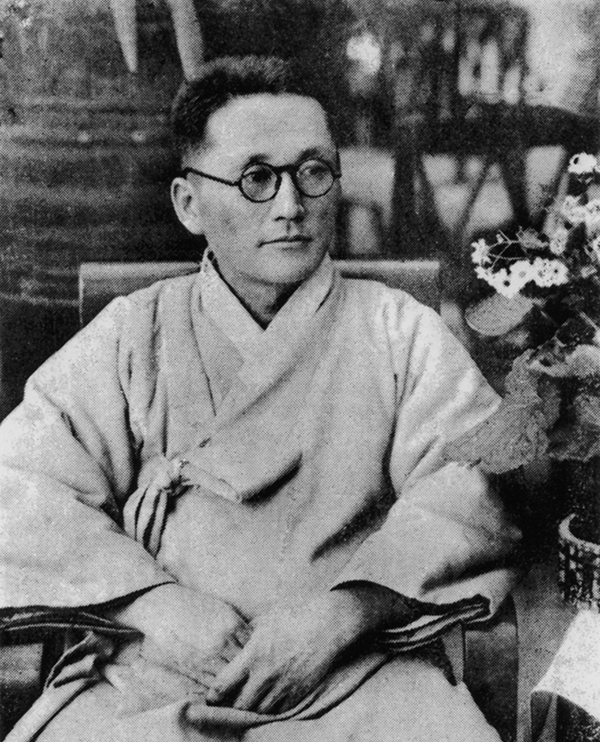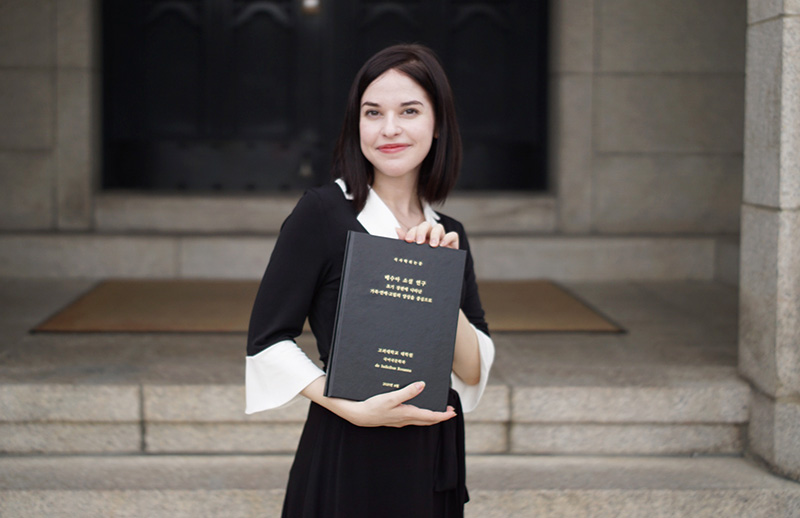내일의 전통, 오늘의 관객을 만나다
월간국립극장
나는 이탈리아에서 나고 자라 베니스의 카 포스카리Ca' Foscari 대학에서 한국학을 공부하고, 고려대학교에서 한국 현대문학 석사과정을 졸업한 후 현재 동 대학원 박사과정을 밟고 있다. 내 주요 관심 분야는 1990년대 한국의 여성문학이다. 하지만 나는 지금의 문학을 이해하기 위해서는 태동기부터 시작해야 한다고 생각해, 자연스럽게 『무정』의 번역에 관심을 갖게 되었다.
『무정』은 1917년 매일신보 연재를 기점으로 대중의 주목을 받기 시작했다. 많은 한국인이 잘 알고 있는 작품의 줄거리를 요약해 보면, 주인공 이형식은 당대 전형적인 근대 지식인으로서 일본에서 유학했고, 외국어를 할 줄 알며, 식민지의 수도 서울에 위치한 명문 학교에 근무하는 젊은 교사이다.
이마저도 부족하다는 듯, 이형식은 서울에서 가장 영향력 있는 인물 중 한 사람의 딸로 아름답고 교육을 받은 젊은 여성과 결혼할 기회까지 잡는다. 언뜻 보면 그는 모든 사람이 꿈꾸는 현재의 안정감과 미래의 희망 등 모든 것을 갖춘 듯 보인다. 그러나 과거의 여성이 그의 삶에 다시 나타난 후 형식은 의심과 두려움에 휩싸이게 된다. 자아 성장의 계기가 된 일련의 결정적인 에피소드를 통해 형식은 비로소 세계와 조국이 처한 역사의 흐름 속에서 자신의 역할을 이해할 수 있게 된다.
이 짧은 줄거리만 읽어도 왜 이 작품이 모든 번역가에게 어렵게 다가오는지 쉽게 이해할 수 있을 것이다. 식민지 시대를 배경으로 근대화와 한국의 계몽주의문학 발전에 첫발을 내디딘 이광수의 『무정』은 문학적 측면뿐 아니라 역사적으로도 중요한 작품이다. 나는 현대문학 연구자로서 이탈리아 독자처럼 완전히 다른 문화적 배경을 가진 사람들도 한국 현대문학의 첫 번째 걸작을 즐기고 충분히 감상할 수 있도록 최선을 다해 번역하겠다고 결심했다.
이 소설을 번역하며 부닥친 수많은 난관 중 첫 번째는 다름 아닌 제목이었다. 제목 번역이 왜 어려운지 이해하기 위해서는 작품 제목의 의미를 분석하는 것이 중요하다. ‘무정’, 즉 ‘無情’은 한국문학 발전의 가장 중요한 요소는 열정일 것이라는 이광수의 믿음과 직결된다. 열정이 없는 문학은 독자의 마음을 사로잡아 감동시킬 수 없기 때문이다. 그러나 ‘무정’이라는 단어를 구성하는 한자는 열정이나 열정의 부족으로 직역된다. 이는 이광수 작가가 처한 당대의 한국문학 현실을 반영하고, 한국이 ‘부족’의 현실에서 ‘열정’의 현실로 나아갔으면 하는 그의 염원을 담고 있기 때문이다.
 춘원春園 이광수
춘원春園 이광수사진 출처: 『춘원 이광수 전집』(태학사)
즉 그는 한국 현대문학의 새로운 길에 첫 번째 돌을 놓으려는 의도였다. 이탈리아어와 같이 한자 기반이 아닌 언어로 한국과 한국어의 고유한 개념을 표현하는 것은 어려우며, 어쩔 수 없이 번역가가 고생할 수밖에 없는 경우도 있다. 의미를 살리기 위해 우회적인 표현을 찾거나, 단어가 원래 의미하려던 것을 포기하고 직역하기도 한다. ‘무정’의 이탈리아어 번역에는 가장 간단한 해결책이 가장 효과적이었다.
『무정』의 경우에는 다행스럽게도 이탈리아어로 ‘senza cuore’라는 표현이 있어 저자의 의도를 존중하고, 한국어 제목이 의미하는 바를 모두 반영하는 번역을 할 수 있었다. 이탈리아어 표현인 ‘senza cuore’는 영어 ‘heartless’와 유사하게 ‘불친절한’ 또는 ‘무자비한’ 사람을 의미할 수 있지만, 문자 그대로 ‘마음이 없는’으로도 번역된다. 이 표현은 문학적 맥락에 따라 ‘공허함’ 또는 ‘열정이 없음’을 의미할 수도 있다. 그러므로 ‘letteratura senza cuore’는 공허한 문학, 열정이나 감정이 없는 문학을 의미한다. 이렇게 보면 ‘senza cuore’는 직역이면서 이광수가 소설 제목을 정할 때 가진 의도와도 일치하는 것이다.
『무정』을 번역할 때 겪었던 또 다른 어려움으로는 소설 전반에 걸쳐 등장하는 많은 유교경전과 한글 고어·고문을 들 수 있다. 동양 독자에게는 익숙할 테지만, 한국 현대문학을 처음 접하는 서양 독자에게는 완전히 낯설게 느껴질 것이다.
이러한 요소들을 감안해 번역할 때, 나는 먼저 책의 전체 내용을 신중하게 조사한 후 원작을 해치지 않으면서 그 의미를 반영하고 동시에 이탈리아 독자에게도 친숙하게 느껴질 수 있도록 노력했다. 동양 문화 고유의 개념 중에는 소설 속에서 여주인공 중 한 명인 영채를 묘사할 때 자주 언급되는 ‘선녀’라는 개념이 있다. 이를 비롯해 이와 유사한 경우에는 직역 후 독자가 그 단어의 의미와 맥락을 모두 이해하는 데 도움이 되는 간단한 설명을 덧붙였다.
전반적으로, 『무정』을 번역하는 일은 한국문학을 사랑하는 사람으로서 도전적이면서 만족스러운 경험이었다. 번역은 다양한 배경과 문화를 가진 독자들을 연결하는 다리이다. 이제 주요 한국문학 작품인 『무정』의 이탈리아어 번역본이 존재하기에, 점점 더 많은 이탈리아 독자들과 한국학을 전공하는 학생들이 이 작품에 다가가 감상할 수 있으리라 믿는다.

번역. 최문의
I was born and raised in Italy and after getting a degree in Korean Studies at Ca' Foscari University of Venice I pursued my masters in Modern Korean Literature at Korea University. I am currently enrolled in a PhD program in the same department and I am mostly interested in women’s literature from the 1990s. However I believe that in order to understand more recent literature we have to start from the beginning, which is what drew my interest towards the translation of “Mujeong”.
It was 1917 when the Korean newspaper Maeil Sinbo started serializing “Mujeong”, drawing the attention of the general public. The summary of the work, which many Koreans will most likely be familiar with is the following: like many other intellectuals of his time, modern man and young teacher Yi Hyeongsik studied in Japan, knows how to read and hold a conversation in foreign languages and is employed in one of the most prestigious schools in the capital of colonial Seoul.
As if this wasn’t enough, Yi Hyeongsik is given the chance to marry a beautiful, educated young woman, daughter of one of the most influential people in the city. At first glance, Yi Hyeongsik would appear to have everything anyone would dream of: security in the present and hope for the future. However, after a young woman from his past reappears in his life, Hyeongsik is met with doubt and fear. It is only through a series of decisive episodes for his self-growth that Hyeongsik is able to understand his role in the world and in the course of the history of his country.
Even reading this brief summary makes it quite easy to understand why this particular work would represent a challenge for any translator. Being set in colonial Korea and representing the country’s first step into modernity and Korean Kyemong, or enlightenment, Yi Kwangsu’s “Mujeong” is a work that is not only important from a literary standpoint but also from a historical one. However, being a modern literature researcher myself, I decided I would do my best to make it so that people from a completely different cultural background, such as Italian readers, could enjoy and fully appreciate the first masterpiece of Korean Modern Literature.
The first of the numerous challenges I was met with when translating this novel was none other than the title. In order to understand why it represented a challenge, it’s important to analyze the meaning of title of the work. ‘Mujeong’ or ‘無情’ connects directly with Yi Kwangsu’s belief that the most important factor in the development of Korean literature would be passion because a literature without passion would not be able to involve and move the hearts of the readers. However, the characters forming the word ‘Mujeong’ directly translate to lack of passion or fervor. This is because they portray the reality of Korean literature at the time of Yi Kwangsu, and his hope that Korea would move from a reality of “lack” to one of “passion”.

In other words, he intended to set the first stone on a new path for modern Korean literature. Expressing certain concepts that are unique to Korea and Korean language in a language that is not Chinese character based, such as is the case of Italian, is often difficult and there are times when the translator has no choice but to make a sacrifice: choosing between saving the meaning therefore finding a roundabout way to express it, or translating directly while letting go of the original meaning of the word. For the Italian translation of ‘Mujeong’ the simplest solution was also the most effective.
Luckily for “Mujeong”’s case, the peculiarity of the Italian expression ‘senza cuore’ allowed for a translation that respected both the intent of the author and a similarity to the original Korean title. While the Italian expression ‘senza cuore’ can, similarly to the English ‘heartless’, mean someone ‘unkind’ or ‘merciless’, ‘senza cuore’ also translates literally as ‘without heart’. This expression, when used in the context of literature, can also mean “empty” or “without passion”. So, ‘letteratura senza cuore’ would mean an empty literature, a literature without any passion or feelings. This way, while ‘senza cuore’ is a direct translation, it also ends up aligning with Yi Kwangsu’s intent when choosing the title for his novel.
Other elements that represented a challenge when translating “Mujeong” were the many Confucian Classics and old Korean texts that appear throughout the novel. It would be familiar to a public of Eastern readers but completely foreign to a public of Western readers who are approaching modern Korean Literature by themselves for the first time.
For these, I carefully researched about the general content of the books before choosing a translation that would reflect what they meant without detracting from the originals, and would still be familiar to the Italian reader. Among concepts that are unique to Eastern culture, is the concept of ‘Taoist Fairy’, that is often mentioned in the novel when describing Youngchae, one of the female protagonists. For this and other similar cases, a direct translation was followed by a brief explanation that would help the reader understand both meaning and context for the words used.
Overall, translating “Mujeong” as a lover of Korean literature was a challenging yet satisfying experience. Translation is a bridge able to connect readers from different backgrounds and cultures and I believe that, now that an Italian translation of such a cardinal work for Korean literature exist, more and more Italian readers and students majoring in Korean Studies will be able to approach and appreciate Yi Kwangsu’s “Mujeong”.

Translator. Moony Choi
월간지 '월간 국립극장' 뉴스레터 구독 신청
뉴스레터 구독은 홈페이지 회원 가입 시 신청 가능하며, 다양한 국립극장 소식을 함께 받아보실 수 있습니다.
또는 카카오톡 채널을 통해 편리하게 '월간 국립극장' 뉴스레터를 받아보세요.
※회원가입 시 이메일 수신 동의 필요 (기존회원인 경우 회원정보수정 > 고객서비스 > 메일링 수신 동의 선택)






